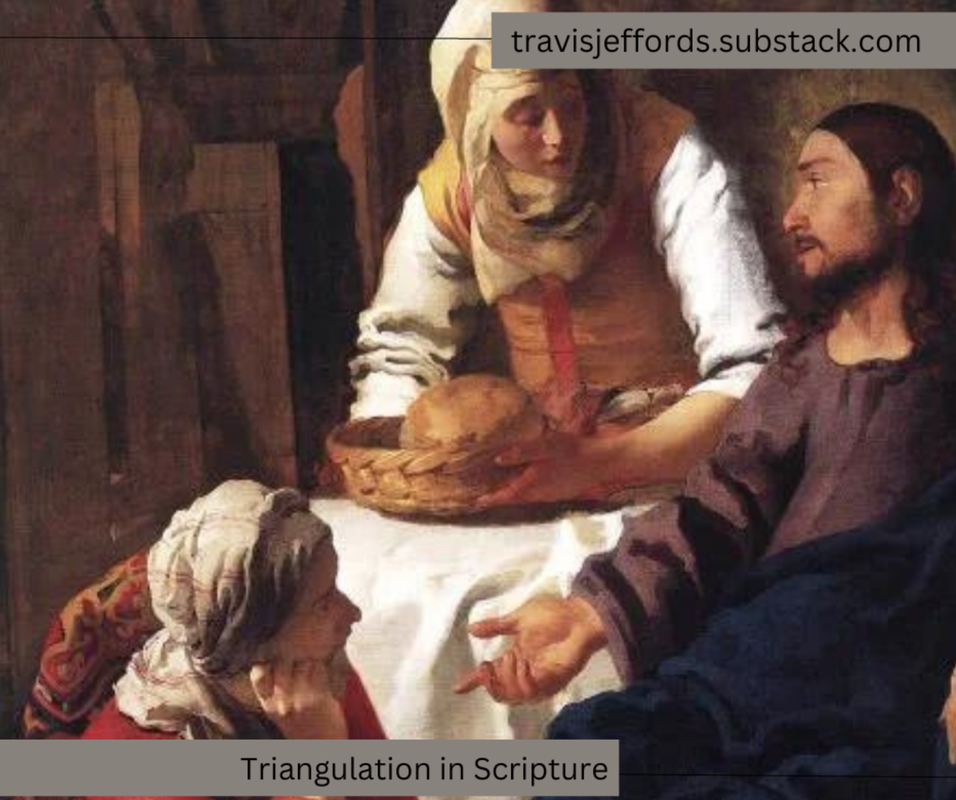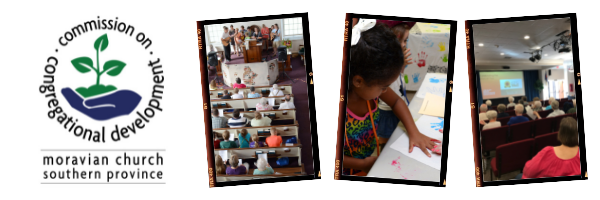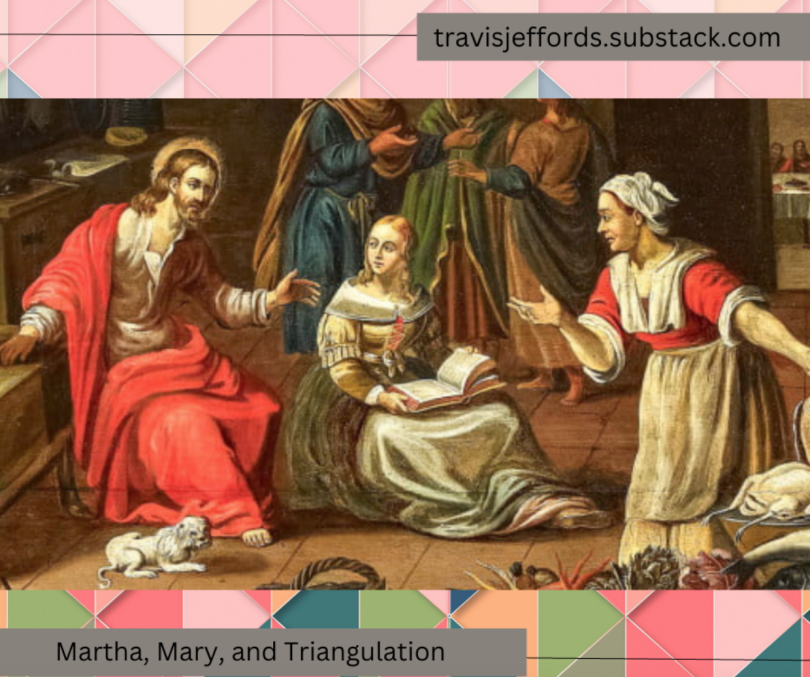
BY TRAVIS JEFFORDS |
The Story of Martha and Mary is one of those classic Bible stories that I’ve heard preached in more directions than I can count (Mary and Martha as stand-ins for contemplative vs over-active life, devotion vs frantic behavior, faith vs works, a proto-feminist take as Mary representing women’s place amongst those closest to Jesus, etc), and all of them help me have an encounter with God in a unique way.
As a licensed counselor however, I can’t help but read this story through a different lens – the lens of triangulation. It admittedly may not be a perfect reading of the text, but, I wonder what would happen if we just play with that dynamic a bit and see what happens… if we risk an encounter with another angle or lens to this ancient story.
But first – what is triangulation?
Triangles vs Triangulation

Relationship triangles occur whenever three people are interacting with each other.
In low-stress situations, one person is always on the outside trying to get back in. In high stress situations, the outside person actually prefers to stay outside.
David Lee Jones has a great article about the difference between triangles and triangulation in The Presbyterian Outlook. He describes the difference between the two as essentially one of motive:
-In triangles, all parties are willing to work towards health/growth.
-In triangulation, one member is trying to control the entire triangle.
Here’s what David Lee Jones says are attributes of mature people working through tension in a triangle as opposed to triangulation.
In healthy triangles people are:
-Open and willing to speak to those persons directly;
-Open to healing the relationship or to at least pursue some degree of peace, reconciliation or justice;
-Not expecting others to take all of the responsibility to fix the problem for them; and
-Not seeking simply to vent or talk behind the other’s back.
Triangulation, on the other hand, is not about seeking a resolution to the tension.
Triangulation is about bringing in a third person to try to control the other person/party in the dyad.
Here are the 5 signs of triangulation according to David Lee Jones:
5 Signs of Toxic Triangulation
-Not open to speaking to the other persons directly;
-Not interested in healing the strained relationship;
-Expecting others to take all or most of the responsibility to fix the situation for them;
-Just wanting to vent or disparage the other person with no real plan for reconciliation; or
-Not very circumspect about their motives or actions.
So what would it look like to look at Marth and Mary and Jesus? Is it a simple triangle? Is it triangulation? And how does Jesus handle himself in the situation?
Triangulation in Scripture/The Bible – Martha and Mary

Here are some thoughts about Martha and Mary and Jesus (Luke 10:38-42 NIV) and how triangles/triangulation plays a role:
Martha is distracted as the NIV puts it. One note – the greek word pûn can be translated as distracted, but also as perplexed.
This perplexity presumably creates a sense of anxiety within Martha, and she feels Mary should help her reduce it and is in some way responsible for it…
However, we don’t see any indication that Martha has spoken to Mary about the perplexity/anxiety she is experiencing. Martha feels that to alleviate her internal anxiety, Mary is needed, but she doesn’t go to Mary first and explain her perplexity/anxiety and ask Mary to help her with it.
The anxiety/tension Martha then feels at Mary’s not helping with preparations (and not helping to relieve Martha’s anxiety), is so great that she attempts to create triangulation with a third person: Jesus.
Here are some factors for me when considering if this is triangulation:
-Did Martha attempt to talk to Mary before going to Jesus?
-Is Martha interested in working through and resolving the tension she feels with Mary, or is she trying to manipulate Jesus into turning on Mary and forcing her to the outside of the triangle?
-Is Martha taking any responsibility for her part in the tension within the dyad of Martha/Mary (for example, owning her own perplexity in the situation, and noticing it’s contribution to the tension within the dyad)
-What’s the intention behind the phrase ‘don’t you care’ that she says to Jesus? Is she trying to shame or make him feel guilty if he doesn’t side with her?
So how does Jesus respond?
First – he begins with a great reflection of feelings, which is a standard pastoral care/counseling technique where you hand the emotions back to the person you are talking to.
In the reflection of feelings that Jesus gives, Jesus affirms to Martha that he has heard and understood what she is going through, and also, allows Martha to hear and understand what she is going through for herself:
“you are worried and upset about many things”
Amazing pastoral care.
Second – Jesus doesn’t take on Martha’s anxious energy, take the bait, and force Mary to the outside of the triangle because of Martha, which is great.
Jesus is able to stay grounded and sees clearly the dynamics of what are happening, and refuses to take on Martha’s anxious energy and direct it towards Mary as well, forcing Mary to the outside of the triangle. This is all great.
But, as a final note, it’s worth pointing out that using this scripture as a lens into triangles/triangulation seems to break down a little here though, because Jesus actually gives different advice concerning how to handle conflict within a tense dyad in a different place in Matthew 18:15 than he shows in this example in Luke. In that situation in Matthew, the appropriate response that models the ethic of Matthew 18:15 would have been to encourage Mary and Martha to have a conversation with each other first. But, perhaps, had Jesus handled the situation in a way that he advocates for in the book of Matthew, none of the other interesting interpretations I mentioned earlier would have been possible.
What do you think?
Triangle or Triangulation?
About the author

Travis Jeffords is a Counselor at Sanctuary Counseling Group in Winston-Salem. He writes on the intersection of church and mental health at travisjeffords.substack.com. Email Travis at [email protected].
Requests for republishing, click here
Want to volunteer to write for us? Click here









